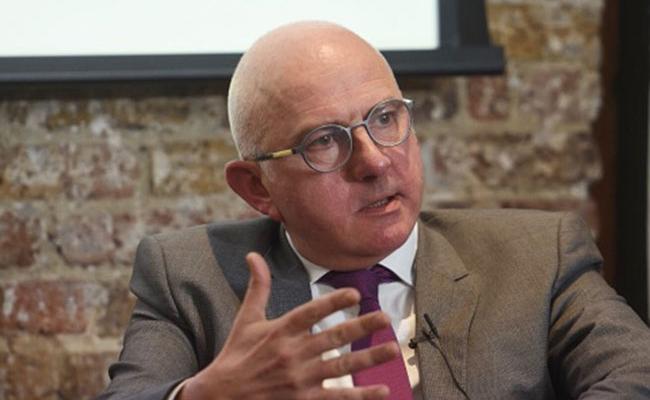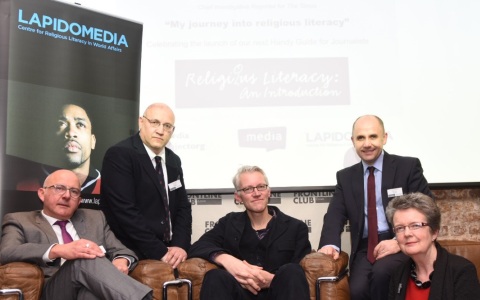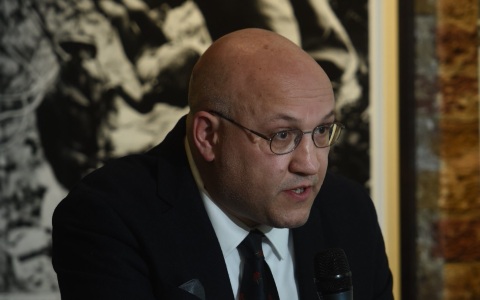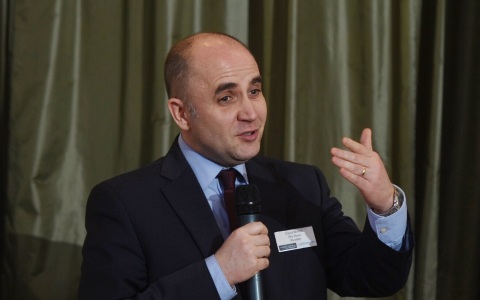UK's top reporters help launch world’s first handbook on religious literacy for media professionals
by - 13th December 2016

THE first guide in the world to religious literacy for media professionals was launched last night at London’s Frontline Club.
Hailed by Tony Johnston, stepping down as Head of Training at the Press Association, who attended the event, as ‘a first class guide to appreciating the importance of faith in relation to a wide range ofstories’, Lapido Media’s Religious Literacy: An Introduction is unique in its attempt to end media inertia about the politico-religious stalemate in Britain.
Dr Jenny Taylor, Founder and Senior Executive of Lapido, cited Professor Adam Dinham of Goldsmiths College, University of London, telling a capacity audience of journalists, diplomats, academics and supporters: ‘We’ve pretty much lost the ability to talk about religion and belief just when we need it the most.’
She said Lapido Media was now working with the Press Association and the National Union of Journalists to produce learning systems that incorporate religious literacy, for which there was ‘a crying need’.

At the launch, The Times' chief investigative reporter Andrew Norfolk, who won seven awards for his investigations into sex-grooming gangs in Rotherham, suggested that a lack of religious literacy had led to government and journalists failing to challenge the acceptance of extremist beliefs by a small proportion of British Muslims.
The event, chaired by historian Tom Holland, whose book In the Shadow of the Sword has become a standard reference on the origins of Islam, also included speeches from Sky News’ Ireland correspondent David Blevins who was nominated for a Royal Television Society award for his coverage of the Omagh bombing.
Dr Paul Stott, lecturer at the London’s School of Oriental and African Studies (SOAS), whose doctorate British Jihadism: the Detail and the Denial will be published by Routledge in 2018, spoke about the Islamization of left-wing politics.
In his speech, Norfolk criticized the British Government for accepting the Islamist-linked Muslim Council of Britain as the single body representing British Islam.
‘What else, after all, but ignorance or willful blindness can explain our government having been duped for several years into regarding the Islamist leadership of the Muslim Council of Britain as the authentically representative voice of Britain’s Muslims?’ he asked.
He also criticized the government for ‘trotting out’ reassurance that jihadist atrocities had ‘absolutely nothing to do with Islam’, but was equally harsh towards journalists for accepting their line.
‘What else but a most un-journalist-like absence of curiosity can have explained the failure of most of us, for so long, even to have tiptoed towards exploring whether that’s always entirely accurate?’
He added: ‘We journalists have been utterly feeble at understanding and sometimes challenging religious beliefs.’
Referring to the spread of Islamic extremism in Britain and the 7/7 attacks, Norfolk added that the reason that such knowledge had become essential was that ‘the actions and beliefs of those who subscribe to a particular faith [had begun] to have a regular impact on the lives of our readers.’
Poisonous
He spoke at length about Deobandi Islam, the conservative tradition hailing from India and followed in ‘around 45 per cent of Britain’s estimated 1,700 mosques [and] a much higher percentage of Islamic schools’.
He cited literature promoting a Manchester seminary founded by Yusuf Motala, one of the most senior Deobandi scholars in Britain, condemning the West, people of other faiths, friendship with non-Muslims, and the arts.
Norfolk said the Deobandi movement was ‘becoming an increasingly influential school of Islamic thought within the UK’ and warned that the teaching ‘routinely pumped out in [its] mosques and Islamic schools’ was having a ‘poisonous impact’.

Paul Stott in his speech highlighted a ‘deeply unsatisfactory omission’ by the BBC that recast the actions of 7/7 mastermind Mohammed Sidique Khan as solely a response to Western foreign policy rather than an act linked to his understanding of Islam.
In the BBC’s uploading of the video, which they described as ‘text in full’, they had cut the opening words which translated from the Arabic as ‘Praise be to Allah, blessings and prayers be upon his prophet.’
Dr Stott said a later line was left in but ignored in which Khan declared: ’Our religion is Islam – obedience to the one true God Allah and following the footsteps of the final prophet and messenger Muhammad. This is how our ethical stances are dictated.’
He commented, ‘The BBC there had some way to go in terms of religious literacy,’ and noted that politicians including the then-Mayor of London Ken Livingstone, and numerous Muslim commentators, had reproduced the argument linking the 7/7 attacks solely to Khan’s rejection of Western foreign policy, which then centred on military action in Afghanistan and Iraq.
Stott rejected this view, arguing: ‘Rightly or wrongly, Khan was structuring his actions in terms of his faith.’
Left-wing
He also warned of increasing Islamization of left-wing politics in Britain. There were some Islamists in Britain who were not advocating isolation, but active participation in order to change society in an Islamic direction.
He saw Islamist influence in the criticism by the former Shadow Home Secretary Andy Burnham of the Government’s Prevent counter-terrorism strategy, which he said followed an ‘Islamist trope’ rather than a civil liberties argument.
He also mentioned instances of research funding in Britain by Islamic organisations ‘nearly all related to the Muslim Brotherhood,’ which presents ‘a rival ideology to liberal democracy or social democracy’.
However, he added: ‘Some of my fellow academics, distracted perhaps by ready funding, seem unable to grasp this.’

Sky News correspondent David Blevins added that a lack of religious literacy could cause ‘serious offence’ and cost journalists credibility.
Reflecting on ‘Christians killing Christians’ in Northern Ireland, he lamented ‘staggering levels of religious illiteracy’ such as journalists reporting that prayers were said for Protestant victims of a bombing, even thoughNorthern Irish Protestants do not pray for the dead.
Rejecting journalists’ traditional scepticism of religion, Blevins, who took time out from Sky to study theology, said he concluded his vocation was religious and could be summed up as: ‘Reporton others as you would have them report on you’.
Read Abigail Frymann Rouch’s interview with Andrew Norfolk here.
Religious Literacy: an Introduction Buy your Kindle copy here. Price £6.24.
Other books from Lapido:
The Caliphate by Sean Oliver-Dee. Price £6.52 in Kindle.
Tablighi Jamaat & and the UK Megamosque Price £9.37 in Kindle
